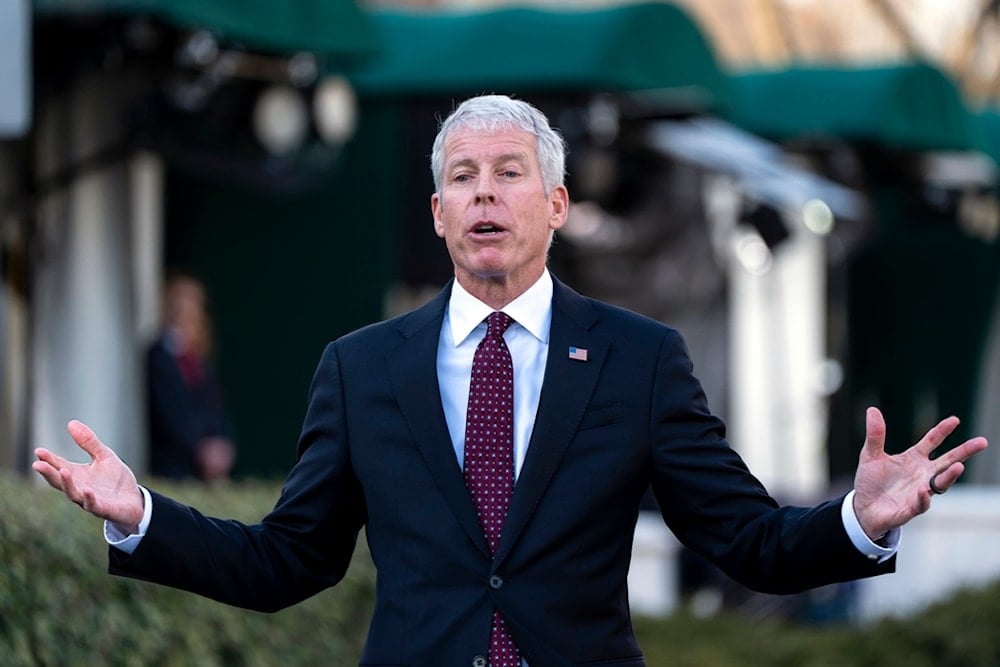US energy chief Chris Wright heads to Middle East for two-week tour
The tour is seen as a step to strengthen ties and prepare for US President Donald Trump’s planned trip to these nations in mid-May.
-
 Energy Secretary Chris Wright speaks with reporters at the White House, Wednesday, Feb. 26, 2025, in Washington (AP Photo/Alex Brandon)
Energy Secretary Chris Wright speaks with reporters at the White House, Wednesday, Feb. 26, 2025, in Washington (AP Photo/Alex Brandon)
US Energy Secretary Chris Wright is set to embark on a nearly two-week visit to three Middle Eastern countries starting on Wednesday.
The trip will begin in the UAE, followed by Saudi Arabia, and end in Qatar. Wright is expected to meet with leaders from these countries to discuss various issues, Reuters reported, citing a source from the Energy Department.
This marks his first official trip as a US representative to Saudi Arabia, the de facto leader of the OPEC oil producer group. The visit is seen as a step to strengthen ties and prepare for US President Donald Trump’s planned trip to these nations in mid-May.
Wright’s visit comes at a significant time, shortly after Trump’s unexpected announcement about "direct talks" between the US and Iran regarding Tehran's nuclear program. It also coincides with global oil prices reaching a near four-year low.
Oil exports
During his trip, Wright will likely have conversations about ensuring an abundant global supply of oil beyond countries where the United States has sanctions on oil exports, including Iran, Venezuela, and Russia, the source indicated.
Oil prices fell due to concerns that Trump's new tariffs could trigger a global recession, and the decline worsened as OPEC+ announced plans to boost production. Following the tariffs, oil dropped over 4%, and further extended losses after OPEC's update, with Brent crude falling more than 5% to $70 per barrel.
On Thursday, eight OPEC+ nations agreed to raise output by 411,000 barrels per day in May, an unexpected decision that prompted oil prices to extend earlier losses.
Trump has expressed his goal to reduce Iran’s oil exports to zero in an effort to prevent the country from developing nuclear weapons. Increased oil production from other global suppliers could help prevent a significant rise in prices due to sanctions on Iran. The US also hopes that low oil prices will pressure Russia, another major oil exporter, to negotiate over its involvement in the war in Ukraine by limiting the funds it uses to sustain the conflict.
Gulf investments
Wright will also discuss investments from the UAE, Saudi Arabia, and Qatar in the US, following Abu Dhabi's commitment to a $1.4 trillion, 10-year investment plan in areas like AI, energy, and manufacturing.
In January, Trump requested that Saudi Arabia increase its planned investment in the US from $600 billion to $1 trillion. Wright, who previously led the fracking company (a business that specializes in hydraulic fracturing, a method used to extract oil and natural gas from deep underground), Liberty Energy, has been vocal about strategies for US oil companies to reduce production costs, especially in response to lower crude prices, to make up for lost revenues. As part of his trip, Wright will visit oil and gas production sites in the Middle East to explore ways of cutting costs.
Wright will tour a nuclear power plant in the UAE during his trip. Saudi Arabia, which has shown interest in developing its own nuclear reactors, has not agreed to the same strict nuclear proliferation agreements as the UAE. Saudi Crown Prince Mohammed bin Salman has stated that the kingdom would pursue nuclear weapons if Iran does, raising concerns about a possible nuclear arms race in the region.

 4 Min Read
4 Min Read









